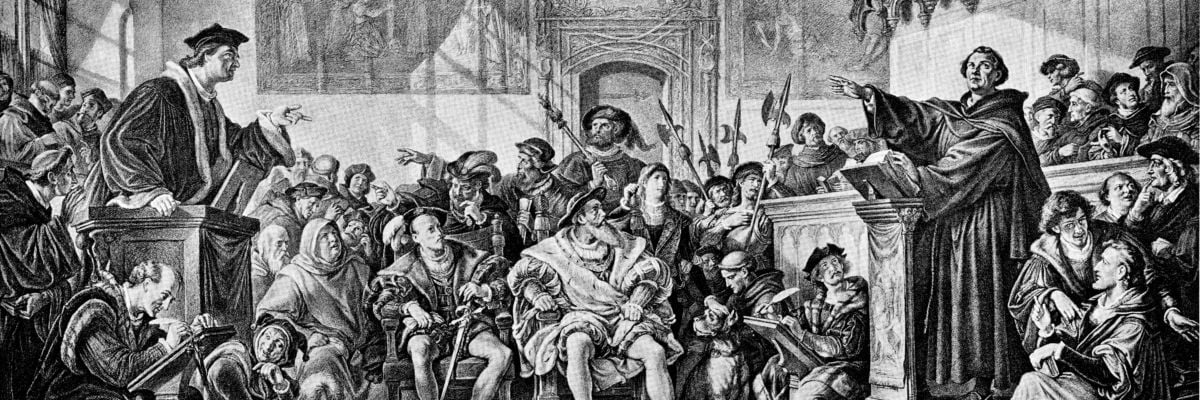
October 31, 1517, is sometimes celebrated as the birth date of the Protestant Reformation. It was on this day that Martin Luther reportedly nailed his Ninety-Five Theses to the door of the castle church in Wittenberg, although there are no contemporary accounts of this event.
The Ninety-Five Theses were not a manifesto for the Protestant Reformation but a set of propositions for a public debate. They did not deal with any of the doctrines that came to be hallmarks of Protestant theology. For example, they make no reference to justification by faith alone or to theology by Scripture alone (sola scriptura).
Luther’s main concern was the Church’s penitential system, particularly the doctrine of indulgences. In fact, the official title of Luther’s posting is Disputation of Doctor Martin Luther on the Power and Efficacy of Indulgences.
An indulgence had been issued to raise funds for construction on St. Peter’s Basilica, and when it was preached in Luther’s area, some of the common folk came away with erroneous ideas. Luther issued his proposition in response.
In a letter to the archbishop of Mainz (dated October 31, 1517), he explained:
I do not bring accusation against the outcries of the preachers, which I have not heard, so much as I grieve over the wholly false impressions that the people have conceived from them; to wit, the unhappy souls believe that if they have purchased letters of indulgence they are sure of their salvation; again, that so soon as they cast their contributions into the money-box, souls fly out of purgatory; furthermore, that these graces are so great that there is no sin too great to be absolved, even, as they say—though the thing is impossible—if one had violated the Mother of God; again, that a man is free, through these indulgences, from all penalty and guilt.
Luther was right to be concerned about these opinions, for none of them are true or correspond to the Church’s teaching. Indulgences do not assure one’s salvation. Performing the external work of an indulgence (contributing money, in this case) does not automatically free souls from purgatory, nor do indulgences free one from the guilt or the penalties of sin.
The practice of indulgences has changed over the centuries and, like any institution regulated by men, it has been subject to abuse. There were real abuses at the time of the Reformation. In addition to superstitious understandings of what indulgences would do, some preachers were unscrupulous in the raising of money. (Contrary to popular legend, indulgences were never “sold” but were granted as an incentive to support charitable causes.)
It is unfortunate that Luther’s response spun out of control and led to progressively graver deviations from Catholic doctrine, in the end producing one of the gravest wounds to Christian unity. It is also unfortunate that the doctrine of indulgences has continued to be misrepresented and misunderstood by both Protestants and Catholics.
What Indulgences Are
The Compendium of the Catechism of the Catholic Church states: “Indulgences are the remission before God of the temporal punishment due to sins whose guilt has already been forgiven” (q. 312). This shows the error of one of the misunderstandings that Luther reported: the idea that through indulgences “a man is free . . . from all penalty and guilt.” Indulgences do not free one from guilt. They presuppose that the guilt of sin has already been forgiven.
Indulgences deal only with the “temporal punishment due to sins,” a concept that many people today are not familiar with. There are consequences of sin that come to us in this world, the world of time. These are called “temporal punishments” in contrast to the eternal punishment of hell.
There is a tendency, particularly in Protestant circles, to think of sin as having only one consequence: guilt and the possibility of hell. If guilt is forgiven, one will go to heaven; if one’s guilt is not forgiven, one will go to hell. This is an incomplete view. Scripture tells us that that guilt is not the only result of sin. The book of Hebrews contains a meditation on the fact that God still rebukes and disciplines his children in order to produce holiness in them, stating that “he disciplines us for our good, that we may share his holiness” even though “for the moment all discipline seems painful rather than pleasant” (Heb. 12:10–11).
The Nature of Punishment
Divine punishments—both temporal and eternal—have often been viewed as calamities deliberately inflicted by God on account of sin. God condemns people to hell the way a judge condemns people to prison. In the case of temporal punishments, God inflicts these the same way parents punish children.
Scripture uses similar images. The parable of the sheep and the goats depicts Jesus judging the nations and telling the goats to depart into eternal fire (Matt. 25:32–46), and Hebrews 12 compares the way that God disciplines us to the way our earthly fathers did. But parables contain symbolic elements, and these comparisons and metaphors have their limits. Recent reflection on the mercy of God has led some to question whether these images need to be understood differently.
In what may be a point of doctrinal development, the Catechism of the Catholic Church warns us away from understanding eternal or temporal punishment on the model of externally inflicted vengeance:
Grave sin deprives us of communion with God and therefore makes us incapable of eternal life, the privation of which is called the “eternal punishment” of sin. On the other hand every sin, even venial, entails an unhealthy attachment to creatures, which must be purified either here on earth or after death in the state called purgatory. This purification frees one from what is called the “temporal punishment” of sin. These two punishments must not be conceived of as a kind of vengeance inflicted by God from without but as following from the very nature of sin. (CCC 1472)
Eternal punishment results from being made “incapable of eternal life” by “the very nature” of grave sin. Temporal punishment is understood as a purification from the “unhealthy attachment to creatures” that even venial sin involves (e.g., too much attachment to food or drink or sex) and also flows from the nature of sin rather than the external imposition of a penalty.
The Role of Grace
One may well ask how, if divine punishments are not inflicted from without but are intrinsic to sin, they can be remitted. It is easy to see how a punishment can be remitted if it is being inflicted externally. If a judge sentences someone to prison, he can overturn the sentence. If parents ground their children, they can rescind the punishment. But if a penalty follows from the internal logic of the offense itself, how can it be remitted?
By God changing the person so that the consequence no longer follows.
In the case of eternal punishment, God gives sanctifying grace to the guilty person, making him again capable of eternal life. In the case of temporal punishments, God can cure the disordered attachment to created things that such punishments are meant to address, avoiding the need for a painful purification. Presumably, this is what indulgences do in the Catechism’s understanding.
When remitting temporal punishments, the Church draws on the infinite merits of Jesus Christ. It also draws upon the prayers and good works of all the saints, for there is “a supernatural solidarity whereby the sin of one harms the others just as the holiness of one also benefits the others” (Indulgentiarum Doctrina 4).
The Role of the Church
God’s intervention through indulgences involves the action of the Church. God has made the Church his instrument for dispensing grace and regulating the spiritual lives of the faithful. He bestowed the power of the keys on Peter (Matt. 16:19) and gave him and the apostles the power of binding and loosing (Matt. 16:19; 18:18).
He also told them, “If you forgive the sins of any, they are forgiven; if you retain the sins of any, they are retained” (John 20:23). God gave us the Church to get us to heaven; the power to forgive and retain sins is principally concerned with the remission of the eternal penalty for sin. But that is not its only function.
God also gave us the Church to help us cultivate holiness in this life. Over the course of time, the Church began to offer indulgences for pious actions, such as saying prayers, reading Scripture, making pilgrimages, and supporting causes such as the building of churches or the endowment of hospitals. These things are good in themselves, and by offering an indulgence as an incentive to do them, the Church gave individuals a reason to school themselves in holiness and grow in sanctification.
Although the history of indulgences is controversial and many misconceptions still exist, they remain one way the Church encourages Christians to cultivate “the holiness without which no one will see the Lord” (Heb. 12:14).



